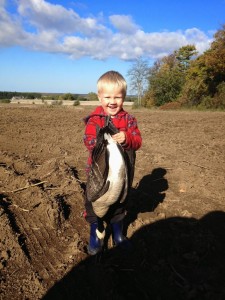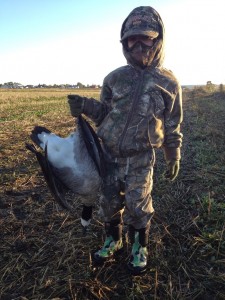These sentimental posts always rise up in me the closer I get to Father’s Day and I’m not ashamed to say that I consider myself fortunate enough to have had an upbringing rooted in the outdoors.
Spending much of my life in rapidly-urbanizing Barrie, Ontario, my childhood may not have been the fully immersive rural upbringing that some of my friends, family, and readers likely had, but countless memories were formed on frequent trips to the family farm just outside the village of Lion’s Head, Ontario. It was there that my siblings and cousins and I played unsupervised in the barn, ran around the rolling fields, slid down hills with abandon in the wintertime, and gardened fresh fruit and vegetables with our grandparents. We loved going to Cape Chin and Otter Lake, travelling there untethered in the back of a station wagon down The Forty Hills Road, my stomach doing giddy backflips as we went up and down the narrow gravel road’s undulations. For many of these excursions down the Bruce County backroads, we were accompanying our fathers to hunt, fish, bring in timber for the woodstoves, or simply to hike the trails and hardwoods. It was those trips with family and friends in one of Ontario’s most picturesque places that I’m sure hooked all of us on the outdoors.


It almost seems that we were destined to become sportsmen, and there seemed to be little doubt in the mind of my father or my uncles that we would embrace the outdoors tradition. But doubts seem to be everywhere now; as a youth I remember reading reams of pages from Outdoor Life, Field & Stream, and the other classic publications that once resided in a box in an upstairs room in the farmhouse and very rarely (if ever) do I recall any mention about declining hunter recruitment, or a participation crisis, or the jeopardized future of the hunting and fishing lifestyles. But the question seems pervasive now, and not one annual publishing cycle in the big magazines seems to go by without alarmed warnings about the shaky ground that hunting, and to a lesser extent, fishing are on. The same articles seem to play out constantly about how ‘kids today don’t hunt’ and how we as the current generation need to capture the attention of new hunters to carry on the legacy.
But why do we think this is the case? Is this a case of the media outlets simply ‘making news’? Is it a fear that we, the current generation, have simply been ‘takers’ and may have not been as diligent as we could have been in giving back to a tradition that we hold dear? Is it real; could it simply be that wilderness is simply too esoteric and occasionally boring to enrapture typical millennials and their fast-paced/instant gratification/media-on-demand needs?
In reality it could be all of the above factors and more. Although I don’t think this generation is significantly different from my generation or the one that came before me, but again that is another debate for another time.
I know many who simply find the escalating costs of hunting untenable. That’s a whole other post (one that I am working on) but licensing and tag fees have been on an ever-climbing trend, equipment costs are also high, and the cost of owning or leasing land can be prohibitive. I’m sure for some, both young and old, it has become too great an expense to hunt, even on public land.
People also like to blame ‘society’, whatever that means, for at least devaluing or otherwise being openly hostile to wilderness pursuits, especially hunting. In this world where we all live out lives in a social media microscope, it is easy to blame the faceless input of internet trolls who shame and deride young hunters, women involved in hunting, or anyone who promotes hunting at large. Still, some of the most recent, although dated, surveys seem to point to much of a non-hunting public that is supportive, or at the very least ambivalent, about hunting. But the voices of a minority of anti-hunting viewpoints can sometimes be louder than this mostly silent majority. Do we perceive a threat where this is only a handful of vocal opponents?
I believe that the continuation of the hunting and fishing traditions, call them the ‘sporting traditions’ if you will, relies on children, because even if they never pick up a gun or a fly rod they can at least be instilled with values of conservation and respect for wilderness. Sure, I’m willing to fight the fight against whomever thinks that the picture of me and my sons with a harvested turkey is offensive, but simultaneously approves of a picture of my kids playing soccer, or eating spaghetti, or singing in their school choir because I do believe in the values of the hunting tradition, but even I can admit sanely that my kids being involved in the outdoors is not about guns and ammo. It is about family time in the outdoors, and learning about how the natural world works without a filter.
My earliest trips into the woods were very rarely about killing something. They were about learning something. Most of the time I was just being a kid, and if you’ve ever tried hunting with a kid you know they are not very often still, quiet, patient, or focused. I enjoyed breaking twigs and asking questions and puttering around in the dirt behind Dad, but those things make it hard for a grown man to shoot a rabbit or a duck.
My father once likened taking my childhood-self hunting to taking a baby raccoon hunting. Having now taken my seven-year-old son out after rabbits, and turkeys, and grouse, and geese, I can say he was not far off.
But he bore me with a wry grin and, I think, the knowledge that patience and repetition with me would grow into something bigger, and it has. Aside from the well-being of my loved ones, there is very little I hold higher than my love of hunting and the outdoors
Before I had an interest in sports and girls, I had rabbit-hunting at Christmastime with a beagle. Before there were high-school bush parties, I had early-September goose hunts. Before I had a fiancé and subsequently a wife, I had deer hunting trips with my family and friends. Before I had sons of my own, I had my memories of being the little boy crouched in a duck blind, standing at Dad’s elbow while he worked a trout stream, or slipping along a trail behind Dad in search of ruffed grouse. Long before I was able to make my own memories and stories, I sat grinning at the table while my father and grandfather and uncles and great-uncles told stories about hunting ducks, deer, grouse, and geese. I reveled in tales of their success and I laughed at the admissions of their sometimes spectacular failures. I knew always that I wanted to belong to their group.
That’s how I came to it, and I think that maybe it is how we can bring the next ones to it.
Patience and repetition. Including them and putting the emphasis on the outdoors and not on the kill. When there is a kill, show the kids the unfiltered side of the woods and the water with respect and compassion for the game animal. Answer their questions not to make yourself feel more heroic, but to help them understand why we love the tug on the line or the warmth and weight of the bird in hand. Let them taste properly-prepared wild game, and let them know the value of the animal’s life when we take it.
We may think it is hackneyed and clichéd. We may think it is ‘too much’ for a young mind to comprehend. It is neither of the above and we were all kids once. If it was not too much for us, it won’t be too much for them.
The men that were my mentors in the outdoors are just men. They aren’t particularly grandiose, or strong, or brilliant, or heroic, but they certainly loom large in the memories of my siblings and my cousins. Like me and you, they are not without their faults, but as unit, they all had the deepest love of the land and the water and a palpable respect for the animals they pursued. Those traits made them similar to thousands and thousands and thousands of other sportsmen living and dead, and made them perfect mentors to shepherd my once young generation into becoming the stewards and mentors we now purport to be.
It is our job to claim the mantle and pass it on now. Do not take it too lightly.
